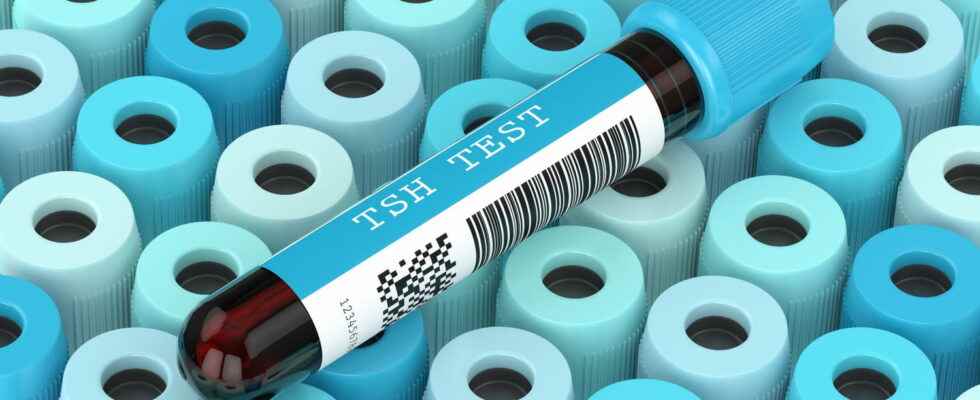The ultra-sensitive TSH (thyroid stimulating hormone) means that it is dosed very precisely. Should blood be taken on an empty stomach? What is the standard rate? The cause of a high rate? Too low a TSH? Read your results carefully.
TSH is a hormone that controls the production of thyroid hormones by the thyroid. The ultra-sensitive TSH is so called to mean that its dosage is ultra precise (it can be dosed at 1/1000th of International Micro-Units per milliliter). To measure it, a blood sample is taken from the bend of the elbow. What is the normal level of ultra-sensitive TSH ? What rate should you worry about? A high rate? Low ? Understand everything.
Definition: what does an ultra-sensitive TSH mean?
The ultra-sensitive assay corresponds to an assay technique more efficient and more precise than the standard TSH test. The thyroid stimulating hormone or TSH (youhyroid-sstimulating hormone), is a hormone secreted by the pituitary glanda small gland located behind the nasal fossae, which has the effect of stimulate the thyroid to secrete the thyroid hormones, T3 and T4, essential for many body functions. Thyroid hormones, for example, regulate the body’s energy level and metabolism.
Indications: when to measure ultra-sensitive TSH?
“The measurement of TSH by ultra-sensitive methods makes it possible to diagnose and monitor hyper and hypothyroidismexplains Dr. Jean-Luc Leymarie, general practitioner. This makes it possible to detect Very low TSHand avoids performing stimulation tests“. This assay also makes it possible to follow the treatment of dysthyroidism (in particular hyperthyroidism). Concretely, to be hyperthyroid may cause weight loss, diarrhea, eye problems, increased heartbeat rate and difficulty withstanding high temperatures. Conversely, to be hypothyroid may cause weight gain, constipation, fatigue, mood swings, decreased heartbeat rate and difficulty coping with low temperatures. Hence the importance of controlling your TSH very precisely.
Do you have to be fasting to measure the ultra-sensitive TSH?
The determination of ultra-sensitive TSH is carried out by a blood sample, which does not necessarily have to be taken on an empty stomach. But it is best to do the TSH test in the morning on an empty stomach, ideally before 10 a.m. to obtain the most significant results.
What is the normal level of ultra-sensitive TSH?
On average, the ultrasensitive TSH level in adults is 0.4 to 4 mIU/L.
Ultra-sensitive low TSH: the sign of what?
An ultra-sensitive low TSH level (<0.03 mIU/L) means that the thyroid is making too much thyroid hormone. A decrease in the blood level of TSH most frequently indicates a hyperthyroidism. “The first symptoms of hyperthyroidism are sometimes rapid weight loss despite a strong appetite, significant nervousness, hot flashes and tachycardia (heart beating very quickly)“, continues the doctor.
Many causes are possible such as:
- Graves-Basedow disease
- Thyroid nodules
- Secondary hypothyroidism (the pituitary gland does not produce enough TSH)
- Excess iodine (drugs and radiological products)
- Pregnancy
- Too much thyroid hormone…
If left untreated, hyperthyroidism can cause serious heart problems. The doctor can prescribe synthetic antithyroid drugssometimes associated with thyroid hormones to ensure a finer balance.
High ultra-sensitive TSH: the sign of what?
In case of abnormal value high ultra-sensitive TSH (> 4 mIU/L), hypothyroidism will be diagnosed. This is a sign that the thyroid is not functioning enough and not producing enough thyroid hormones since there is feedback from the thyroid to the pituitary gland. “Symptoms include extreme fatigue, paleness, weight gain, chilliness, cramping, muscle aches, constipation, and a puffy face“, specifies our interlocutor.
The causes are various:
- Hashimoto’s thyroiditis, an autoimmune disease most commonly involved
- pituitary tumor (rare)
- taking medication (amiodarone, lithium, tamoxifen, etc.)
- wrong dosage of thyroid replacement drugs…
Which ultra-sensitive TSH level during pregnancy?
In pregnant women with known hypothyroidism, a TSH assay should be done as soon as possible. The dose of levothyroxine should be increased by approximately 25 to 30% upon diagnosis of pregnancy, even if the TSH is normal. The target TSH level in pregnancy is 2.5 mU/L.
Thanks to Dr Jean-Luc Leymarie, general practitioner in Rueil Malmaison (92).
